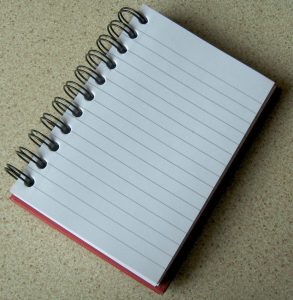
photo credit: creative commons.
Isabel recently posted an excellent blog post about flowcharts: what they are, and why you should be using them. (I’m definitely trying that method out on my next long paper—thanks Isabel!) I’ve been thinking these days about something related, which came up at the first meeting of my department’s senior thesis cohort: when you’re doing a lot of reading, how should you take notes?
I think it’s worth being mindful of your note-taking methods even in a project that is shorter than a thesis. Taking notes may seem rote (couplet unintended), but it’s a skill like anything else, and it might take some practice to help you hit your stride. Earlier in college, I took notes exclusively in the margins of my papers. Even in in-class discussion, I would record my thoughts by continuing to annotate, rather than writing in my usual notebooks. I figured I was going to be looking back at the text I was writing about anyways, and it was too laborious to try to copy everything important out of the texts and into a separate notebook.
Now, however, I wish I had forced myself to become literate in taking notes outside of a text’s margins earlier in college. You don’t have to reproduce every important aspect of a paper or text in your own notebook, but you should give yourself some tips on what you thought about it. As assignments have grown in length, and the number of things I’m reading has grown accordingly, I find myself struggling to remember what information came from which reading if I don’t take notes on all of them alongside one another, in my notebook rather than the page of the reading itself. Additionally, your courses will probably narrow in focus as you go. In an introductory history class, it’s easy enough to remember that one week that dealt with the Indian Rebellion of 1857; by the time you’re taking a more advanced seminar exclusively on the decade around that rebellion, different primary and secondary sources may begin to blur into one another much more easily.
Taking notes on several readings in one place can take a lot of different forms—maybe a simple series of notebook entries, maybe a set of collated documents on your computer, or maybe even a flowchart—but the big upside across the board is that they’ll help you organize your thinking after you’ve done your reading. You’re effectively creating a personalized guide for yourself, to all of the reading that you’ve done. Consulting that guide is a whole lot easier than flipping through every page of every reading to try to track down one witty analytical comment you think you made in a margin somewhere. It also lowers the odds that you’ll spend extra time on readings that you didn’t find that useful the first go-around: I’ve re-skimmed a whole book introduction before realizing that I had done the same thing just as fruitlessly a month earlier, and that’s definitely time that could have been better spent.
Additionally, try to keep track of your bibliographic information as you go—including bibliographic information that won’t go into your final “Works Cited” list. In this era of eBooks, it’s harder than ever to remember exactly where you found something: you’re less likely to have a physical encounter at all with a given book, and even less likely to be hoarding a trove of books in a single, teetering pile on your plasticky dorm room desk. You have fewer clues with which to distinguish between sources, so building out a rough bibliography as you go can help you track things down again, which is especially useful for online resources you can’t download, like many eBooks. Add information that won’t end up in the final version, but is useful to you, for instance information about what a source was like to read, and what you were thinking about while you read. Did you find this through the Columbia Libraries? JSTOR? ProQuest? A classmate? Even something like “excerpt available on JSTOR” can save you from an unnecessary hunt through the internet two weeks later.
Finally: you don’t have to craft a personalized method of note-taking on your first go. If you’re consistent about being methodical in any form, though, you can try out different methods earlier on in college. By the time you’re writing longer papers, it will be easier to stick with one method the whole way through. Your early coursework can help you figure out what works best for you.
